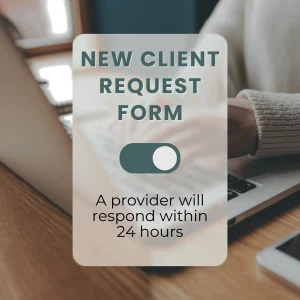
3 Ways to Cope with Change:
Acceptance, Empowerment & Mindset
Sometimes change is good, but sometimes we struggle to adapt and cope with change that may be outside our control. Change, inevitable and relentless, often tests our mental and emotional resilience. Whether facing personal upheavals, professional shifts, or societal changes, the ability to adapt is crucial for our well-being. Central to this adaptability are the mental health skills that enable us to accept the aspects of our lives we cannot change and empower us to take charge of those we can.
Therapy aims to not only help you cope with change but also to embrace it as a pathway to personal empowerment and growth. We’ll explore the importance of acceptance, mindset and empowerment is how to effectively cope with change.
How We Cope with Change Impacts Our Mental Health
Change, by its nature, forces us out of our comfort zones, triggering a spectrum of emotional responses from excitement to fear. The uncertainty that accompanies change can be particularly taxing on our mental health, leading to stress, anxiety, and even depression. However, viewing change through the lens of opportunity rather than a threat can significantly alter our experience of it.
Acceptance & Letting Go
Acceptance doesn’t mean resignation or giving up; it means recognizing and coming to terms with the aspects of a situation that are beyond our control. This skill is rooted in mindfulness, the practice of being fully present and engaged in the moment without judgment.
Reflective Journaling
Writing about your experiences and feelings can help you process and accept them.
Cognitive Reframing
Challenge and change negative thought patterns by looking at situations from different perspectives.
Mindfulness Meditation
Regular practice can enhance your ability to remain anchored in the present, reducing worries about the past and future.
Reflective Prompts for when You're
Struggling to Cope with Change
- What am I feeling right now, and can I allow myself to fully experience this emotion?
Acknowledge your feelings without judgment. Allowing yourself to feel can be a powerful step towards acceptance. - What aspects of this situation can I not change?
Identifying what is beyond your control helps in focusing your energy on what you can influence. - What can I learn from this situation?
Every change brings lessons. Reflecting on what you can learn helps in finding value, even in difficult times. - How has overcoming past challenges made me stronger or more resilient?
Remembering your strengths and how you’ve navigated past changes can boost your confidence and acceptance of current situations. - In what ways can I bring kindness and compassion to myself during this time?
Self-compassion is a cornerstone of acceptance. Treat yourself with the same kindness you would offer a friend.
Reflections to Encourage Acceptance to Best Cope with Change
- The Nature of Impermanence:
Everything in life is in a constant state of flux. Reflecting on the impermanent nature of things can help you embrace the present moment and the changes it brings. - The Value of Now:
Focus on the present moment. Often, acceptance is found when we cease fighting what is and start living in the ‘now.’ - The Power of Release:
Consider what it would feel like to release the struggle against change. Imagine the freedom and peace that comes with letting go and accepting what is. - The Path Forward:
With acceptance, each step forward becomes lighter. Reflect on how acceptance not only eases your current journey but also paves the way for future growth and opportunities.
How to Cope with Change Using Empowerment Skills
While acceptance is crucial, it’s equally important to recognize and act on the aspects of our lives that we can change. This empowerment comes from identifying our values, goals, and the steps we can take towards them, despite the uncertainty that surrounds us.
Balancing Acceptance & Control During Changes
The serenity to accept the things we cannot change, the courage to change the things we can, and the wisdom to know the difference; this timeless advice is an ongoing process that requires introspection, patience, and practice.
Goals Setting
Goal Setting: Start with small, achievable goals to build momentum and confidence.
Seeking Support Through Changes
Seeking Support: Don’t go it alone. Lean on friends, family, or professionals who can offer perspective, advice, and encouragement.
Problem-Solving to Cope with Change
Problem-solving Strategies: Break down problems into manageable pieces and tackle them one at a time.
How A Mindset Shift Helps to Cope with Change
View Challenges as Opportunities
Reframe obstacles as chances to learn and grow, rather than insurmountable problems.
Practice Self-Compassion
Be kind to yourself through the ups and downs of change. Your best effort is enough.
Embracing Mindfulness to Cope with Change
Cultivate a present-centered awareness that fosters acceptance of what is, reducing resistance to change.
Maintain a Positive Outlook
Optimism is a key component of resilience. Try to find the silver lining in difficult situations.
You Can Learn To Cope with Change with Resilience!
As we navigate the ebbs and flows of life’s changes, let’s remember that the skills to cope, adapt, and thrive are within our reach. It’s not the change itself, but how we respond to it, that defines our journey. With acceptance and empowerment as our guides, we can transform the uncertainty of change into a path of growth and resilience.
Coping with change is not just about managing the stress and uncertainty that it brings; it’s about embracing the journey of continuous personal growth and development. By cultivating mental health skills focused on acceptance, empowerment, self-care, resilience, and continuous learning, we can transform our experiences of change from challenges to be endured into opportunities for growth and self-discovery.
FAQ's About Therapy in New Jersey
How do I get started as a new client?
New Clients can reach out to us directly via call, text or email here:
Or, you can complete a new client form and we’ll reach out to you within 24 hours here:
What are your specialties?
Our therapists have dedicated their clinical work to specific niche areas. Check out our therapy service page here to learn about our areas of expertise
What type of therapy do you offer?
We offer traditional and non-traditional therapy
Traditional therapy, such as talk therapy incudes:
- Individual therapy
- Couples Counseling
- Family Therapy
- Cognitive Behavioral Therapy
- Emotion-Focused Therapy
Do you offer Ketamine Therapy?
Yes! Ketamine has shown promise in treating various mental health conditions, including PTSD, Anxiety, Depression, Phobias and OCD. As Ketamine therapy providers, we offer this service to help clients break cycles of thinking traps that lead to compulsive behaviors.
Is Online Therapy As Effective As In-Person Therapy?
Online therapy is essentially face-to-face counseling, just conducted remotely. Studies show that teletherapy is as effective as traditional counseling. Professional organizations and state governments recognize its benefits and have set regulations for it. However, like any therapy, its success in achieving your goals isn’t guaranteed. It’s important to discuss with your therapist whether teletherapy is working for you.
What age groups do you serve?
Currently, we work with New Jersey clients ages 10+
Do you offer traditional talk therapy?
of course! though we have some unconventional therapy approaches, we are rooted in evidenced based practices. Talk therapy is a major player in the therapy room! See What we Treat and Integrative Services for more information
What Geographic Areas Are Served?
Currently, we serve clients in New Jersey and are expanding to other states as telehealth laws evolve. While telehealth offers the convenience of attending sessions from anywhere, state laws require clients to be in-state during their session.
Does my insurance cover my visits?
We provide”Courtesy Billing” for clients who are using the Out-of-network insurance benefits.
Our Insurance Page shares a small blurb about Why We Left Insurance Panels
Can I Change Therapists If I'm Not Happy?
Yes, you can switch therapists to another provider within the practice, or we can provide you a referral if preferred. We want to ensure that your time and effort are well spent, and that you are getting the relief you need, that’s why we work collaboratively with each other in the practice, as well as outside therapists who we know and trust.
What is your cancellation policy?
We ask that clients provide at least 24 hours notice in the event that they need to cancel to avoid the 50% cancellation fee. we understand that life happens and do our best to be flexible & reschedule.
How Do I Know If Therapy Is Helping?
You should feel like you’re making progress. Signs it’s working include:
Feeling comfortable talking to your therapist
Your therapist respects boundaries
You’re moving towards your goals
You feel listened to
You’re doing better in life
Your self-esteem is getting better
Is Online Therapy Easy to Use for Non-Tech-Savvy People?
Yes, it’s pretty simple to access sessions. You’ll need basic internet skills, such as opening and visiting the patient link sent to you via email. It’s similar to video chatting like Facetime or Zoom. We can also walk you through it on the phone the first time to ensure a strong connection
What Questions Should I Ask My New Therapist?
Feel free to ask anything. Some good questions are:
- How often will we meet?
- What do you specialize in?
- What experience do you have with my issue?
- What outcomes can I expect?
- How will I know I’m progressing?
- How long do you usually work with clients?
- How will we set my treatment goals?
How Should I Prepare for My First Session?
Showing up is all that you need to do! But if you really want to get the most out of session, it could help to take some time to think about what you want from therapy. It helps to write down your goals, questions you have or things that you feel are important to share.
What is the difference between associate therapists & fully licensed therapists?
Our Qualifications:
Our founder, Rebecca Sidoti, is a highly qualified, state-licensed therapist and supervisor with extensive training in anxiety related disorders and innovative treatment such as Ketamine Therapy. Mind by Design Counseling adheres to standards set by the our governing counseling boards.
To see each providers credentials, training and licenses, visit our “Meet the Therapists” Page to learn more.
- LAC/LSW are therapists who may practice clinical work under the supervision of a fully licensed therapist.
- LPC/LCSW are therapists who have completed the necessary clinical hours post-graduation under supervision and can practice clinical work independently.
Is Virtual Counseling Suitable for Everyone?
Online therapy might not be as effective for individuals with chronic suicidal thoughts, severe trauma, significant mental health history, or those recently in intensive care. Such cases often benefit more from traditional, in-person counseling. We’ll help you decide if our online services are right for you during your intake and evaluation.
What Equipment is Needed for Online Therapy?
To join a session, log in using the credentials we provide. No downloads are needed. Our platform, compatible with both individual and group sessions, requires:
A computer or mobile device with a webcam and internet access.
We’ll help you test your setup before your first appointment to ensure a reliable connection. iOS users should use the Safari browser for mobile and tablet sessions.
What Questions Will Therapists Ask Me?
It depends on your goals. Expect questions about your thoughts, feelings, relationships, work, school, and health. They’ll ask to understand your therapy goals.
How Do You Keep Client Information Secure?
Security and Confidentiality of Sessions:
Your privacy is crucial to us. We use TherapyNotes, a HIPAA-compliant platform, ensuring secure and confidential teletherapy sessions. This platform’s security features include encrypted video connections, secure data transfers, and encrypted databases, ensuring your information is safe at all times.
What is VRT used for?
we use VRT to support Exposure Therapy, a long standing traditional therapy modality to treat phobias, anxiety and stress. we send a headset directly to your home so you can access VRT from anywhere.
VRT not only helps with exposure therapy for phobias, but is great for ADHD, mindfulness, PTSD and social anxiety.






